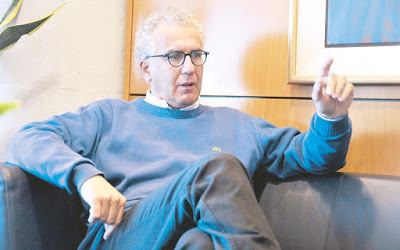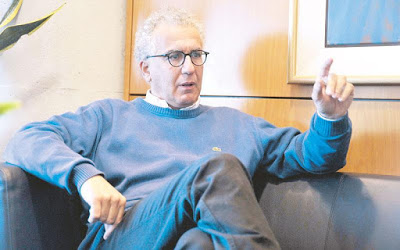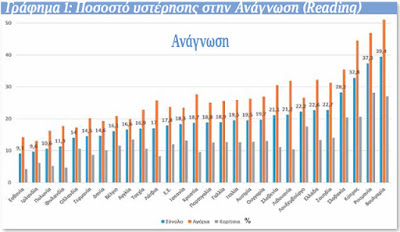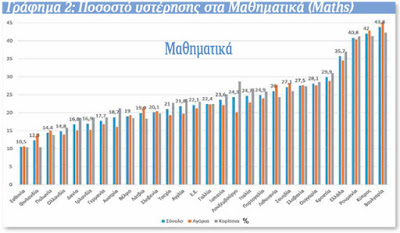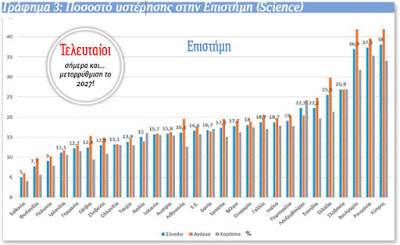It is ringing the alarm and mobilization bell for the level of public education provided in Cyprus.
His entire article as published in "Phileleftheros tis Kyriakis":
Many times we discuss and argue about the quality of public education in our country and how it compares to education systems both in Europe and in the rest of the world. Most developed countries have indicators that measure the quality and results of the learning process and with these results they try to implement innovations or even improve their educational policy.
What is happening in Cyprus, where we are proud of the quality of public Primary and Secondary Education?
How do we compare to other countries?
According to the published study of the PISA program (Program for International Student Assessment) for the period 2009-2012 entitled "What students know and can do - Student performance in Reading, Mathematics and Science", the results do not appear to be so favorable for our country.
It is noted that this program evaluates the quality and equality of school systems in 70 countries, which are 9/10 of the world economy. Interestingly, the PISA program represents a commitment from participating countries to monitor the results of education systems in a pre-agreed international context and, subsequently, provides the basis for international cooperation in the formulation and implementation of education policy. Let us see, however, how Cyprus is compared to the other European countries evaluated under the PISA program in terms of lag rates in the three categories: Reading, Mathematics, Science (for 2012).
● reading - According to the results in the "Reading" category, Cyprus is among the last three countries evaluated within the European Union (EU). And while the average overall lag in Reading for the EU. is 17,8%, Cyprus has a much higher rate of backwardness in the category of "Reading" which reaches up to 33% (ie 1 in 3 students).
● MATHEMATICS - In the category "Mathematics" the performance of the students of Cyprus is even worse, ranking the country in the penultimate position, with a total percentage of backwardness of 42%, when in the EU. this percentage is only 22,1%.
● SCIENCE - And, finally, we see the most disappointing result regarding the lag in the category "Science", where Cyprus appears in last place with a percentage of 38% compared to the EU as a whole. which amounts to 16,6%.
These disheartening results for the level of our students are a slap in the face to the public education system and should concern us deeply instead of celebrating scattered educational reforms and the possible abolition of the list of appointees in 2027!
It is not a reform, inaction in the face of challenges, timidity, denial of responsibilities, waste of critical time, procrastination, complacency so that no one is bothered, problems are not revealed and there is, superficially, no cost. At a time when we want to put forward the argument of a developing country, a country of excellent services and progress, how can we remain inactive when we know the existence of these low percentages in these subjects?
We need, very clearly and immediately, a complete reform of the educational system of our country. To learn from the good practices of other countries and to come to those that can be applied in our country, with the help of experts who have international experience, and not to be consumed in reproducing designs, of the same people, of the same ideas.
What about the thousands of teachers in schools and the many who are seconded to various positions in the Ministry of Education and elsewhere? How can we make the most of their knowledge and skills and how can we eliminate from the system all those who are unable to help our children?
I would very much like to see a serious approach to the issue from the trade unions of our country. To finally see realistic and detailed proposals from the official bodies of teachers and the competent Ministry. It is time for action to reverse our low ranking before it is too late. A small country like Cyprus, which relies mainly on its human resources, cannot withstand these extremely low rates compared to other European countries.
I think that one of the big problems of any effort to reform Primary and Secondary Education is that the Ministry is discussing them with the trade unions. This is because organizations have interests that may conflict with some of the proposals for modernization and reform and, therefore, cannot and should not participate in this dialogue. A typical example is the distortions of the new program schedule, as a result of the conflicting interests of the teachers' branches.
I wonder how many millions are lost in man-hours with the large number of teachers who are occasionally seconded to the Ministry of Education, as well as why so many hundreds (?) Are needed in secondment.
In addition, the actual amount spent on trade union hours (dozens of trade unionists in OELMEK, OLTEK and POED) from the taxpayer's money is questionable, given that in most developed countries this amount is covered by subscriptions with organizations and not from public money.
Could not all this money, in real money or man-hours, be used more effectively to improve our education policy?
In the context of transparency and correct information, I believe that an important piece of information, to which every family should have access, is the difference in the rates of backwardness of our students between the children of public and private school. It would be very useful for the proper information of the citizens to make this information public by the Ministry of Education.
Our country spends almost 1 billion euros on education. And do not be tempted to compare it with other countries.
Of course, as mentioned in this study, the GDP of each country significantly affects the educational success, but this explains only 6% of the difference in the average performance of students. The remaining 94% reflects the ability of public policy to make a difference. The example of Shanghai-China is brilliant, being at the top of every category considered by the PISA program, with modest financial resources and operating in a diverse social context.
Nevertheless, if one compares the expenditures of the last ranked countries together with Cyprus, ie Romania and Bulgaria, Cyprus clearly spends much larger amounts. Therefore, we are not doing something right.
In recent years we have seen many ambitious and commendable efforts by the current ministers of the Ministry of Education and Culture to modernize education policy and introduce new systems that will meet the requirements and developments of modern society. Unfortunately, from what international studies show, we have not yet been able to find the system that will make the best use of the human resources and the money invested each year for Primary and Secondary Education.
Conclusions vary. Of course, we need a new education policy. Of course, we need new people to study and propose this new education policy, in addition to trade union, political or other interests. Why; Because it is not done otherwise. Why we can not continue to allow our children to crawl to the bottom of the European and international rankings. We can;
* Konstantinos Christofidis is the rector of the University of Cyprus
